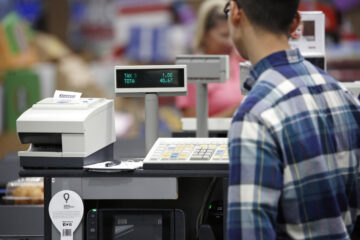Over the past few months, economic activity in the U.S. has undergone a rapid shift, especially after President Donald Trump started a trade war that involves multiple countries.
While Americans were already battling inflation and a higher cost of living, Trump on March 4 enforced 20% tariffs on all goods imported from China, and 25% tariffs on all goods imported from Mexico and Canada.
Tariffs are taxes companies pay to import goods from overseas, and the extra cost is often passed down to consumers in the form of price increases.
Related: Lululemon CEO sounds alarm on unexpected customer behavior
During an interview with Bloomberg News in October, Trump said his tariffs will boost business in the U.S.
“The higher the tariff, the more likely it is that the company will come into the United States and build a factory,” said Trump.
Since then, consumer spending in the U.S. declined for the first time in two years. In January, economic activity declined by 0.2% after it increased by 0.8% in December, according to the U.S. Department of Commerce’s Bureau of Economic Analysis.
BlackRock CEO raises major red flag
In a recent letter to shareholders, BlackRock (BLK) CEO Larry Fink warned that anxiety about the economy is the highest he has ever seen.
“I hear it from nearly every client, nearly every leader — nearly every person — I talk to: They’re more anxious about the economy than [at] any time in recent memory,” said Fink in his letter.
Consumers have indeed been growing anxious about the economy and the impact Trump’s tariffs will have on prices.
BlackRock CEO Larry Fink.
Eugene Gologursky/Getty
According to a recent market pulse survey from InMoment, 56% of the survey’s respondents expected prices for goods and services to increase as a result of Trump’s tariffs. In response to these anticipated price hikes, 60% of respondents said they are contemplating changing their shopping behavior, with more expecting to shop less rather than more.
Many large retailers such as Walmart, Dollar General, and Best Buy have also recently lowered their sales expectations for 2025 in response to recent changes in customer behavior.
Related: BlackRock CEO Larry Fink believes ‘it’s a bit crazy’ that baby boomers retire at 65
For example, Walmart said in its most recent earnings report that it expects its net sales to increase by only 3% to 4% this year, falling short of investor expectations.
“Our outlook assumes a relatively stable macroeconomic environment, but acknowledges that there are still uncertainties related to consumer behavior and global economic and geopolitical conditions,” said Walmart Chief Financial Officer John Rainey during an earnings call in February.
BlackRock CEO highlights a big problem in the economy
Fink also said in his letter that despite the recent success of the U.S. stock market, not everyone has profited from it.
“Over the past 40 years, global gross domestic product (GDP) has grown more than in the previous two thousand combined,” said Fink. “This extraordinary growth — partly propelled, it must be noted, by historically low interest rates — has driven exceptional long-term returns. But of course, not everyone has shared in this wealth.”
He also emphasized that capitalism has not been beneficial for enough people, and that more Americans should become investors so they can profit off of the market’s growth.
More Labor:
Meta’s recent layoffs take an unexpected turnGoldman Sachs defends a work policy shareholders fearDell CEO sends a stern wake-up call to employees
“Protectionism has returned with force,” said Fink. “The unspoken assumption is that capitalism didn’t work and it’s time to try something new. But there’s another way to look at it: Capitalism did work — just for too few people.”
More Americans are struggling financially
Fink’s comments come during a time when many Americans are living paycheck to paycheck.
According to a recent survey from NerdWallet, 57% of Americans said they’re currently living paycheck to paycheck. Specifically, 42% of Americans with household incomes of $100,000 or more said they are dependent on their next paycheck to cover their expenses.
Dollar General, which mostly sells essential items typically priced between $1 and a little over $10, has even noticed that the financial situation of its customers has “worsened.”
A couple is seen paying close attention to money and finances.
Shutterstock
“Our customers continue to report that their financial situation has worsened over the last year as they have been negatively impacted by ongoing inflation,” said Dollar General CEO Todd Vasos during a recent earnings call. “Many of our customers report that (they) only have enough money for basic essentials, with some noting that they have had to sacrifice even on the necessities.“
Amid this concerning consumer trend, JP Morgan Research flagged in a recent press release that the probability of a recession this year stands at 40%, which is higher than the 30% it previously predicted.
“We now see a materially higher risk of a global recession,” said Bruce Kasman, chief global economist at J.P. Morgan in the press release. “The administration’s shift in the application of tariff policy and the potential impact on sentiment have contributed to this increased risk.”
Related: Veteran fund manager unveils eye-popping S&P 500 forecast


